Herinnering aan Gerard Reve
Vandaag is het precies 6 jaar geleden dat de Nederlandse dichter en schrijver Gerard Reve overleed. Zie ook alle tags voor Gerard Reve op dit blog en evenneens mijn blog van 14 december 2006. en mijn blog van 9 april 2006.
ROEPING
(voor de Zusters van Liefde, te Weert)
Zuster Immaculata die al vier en dertig jaar
verlamde oude mensen wast, in bed verschoont,
en eten voert,
zal nooit haar naam vermeld zien.
Maar elke ongewassen aap die met een bord: dat hij
vóór dit, of tegen dat is, het verkeer verspert,
ziet savonds reeds zijn smoel op de tee vee.
Toch goed dat er een God is.
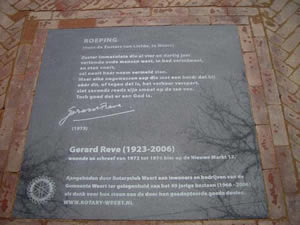
Gerard Reve (14 december 1923 – 8 april 2006)
Gedenksteen op de Nieuwe Markt in Weert met het gedicht „Roeping“
De Nederlandse dichter Hanz Mirck werd geboren op 8 april 1970 te Zutphen. Zie ook alle tags voor Hanz Mirck op dit blog.
Hints
De vorm van een hart is een leugen
maar in haar tuin, het hart van een middag
heeft ze op me gewacht, haar stralende gezicht door licht
omkranst, ze krijgt goudinjecties om kalm te blijven
Ze heeft onze afspraak afgezegd, opnieuw gemaakt
Het gras woekert, bloemen overschreeuwen elkaar,
ranken rond de tafel met blinkend bestek
veldsla omzoomd door tomaten
En in het midden van de tafel een bord
mat glimmende filet americain
in de vorm van een geprakt hart
Er is iets bijbels aan haar naam
Mijn blik dwaalt van haar wimpels
naar de geloken blinden van huis
Goedbedoeld advies
Ik ben een steen ik lig en heb geduld. Een steen neemt de
temperatuur van haar hand aan, koud als ze koud is, warm
en warmte koestert hij. En dat zij is geboren om haar eigen
glazen in te gooien, wat geeft dat, dat geeft een vrolijk geluid
Als ik breek zwijg ik: zo zie ik er van binnen uit, wij gooien
nooit. Dat ze – nadat ze me aan een zijden draad hing –
uren danst, omringt door wat kwaakt en springt, ach
dat is onze wereld niet. Stenen kennen geen pijn, barst-
en alleen bij te grote verschilen van binnen-
en buitentemperatuur, liggen graag onder ruisende bomen
en kunnen dat niet zeggen maar ik zeg het toch voor jou,
want jij bent het die daarvan houdt. Alleen door water worden
stenen glad geslepen, glinsteren in het maanlicht, sommige
met prachtige flonkeringen, lief, wordt toch ook een steen
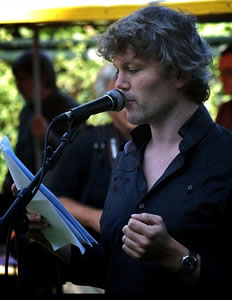
Hanz Mirck (Zutphen, 8 april 1970)
De Duitse schrijver, essayist en vertaler Christoph Hein werd geboren op 8 april 1944 in Heinzendorf in Silezié. Zie ook alle tags voor Christian Hein op dit blog.
Uit: Das Wildpferd unterm Kachelofen
“Woher kennst du sie alle?”, wollte ich weiter wissen. Jakob dachte nach. “Ach, das war ganz verschieden. Den Clochard habe ich auf einem Waldweg gefunden.” “Gefunden?”, unterbrach ich ihn. “Ich habe ihn dort getroffen”, erwiderte er, “aber das ist eine lange Geschichte.” “Erzählst du sie mir?” Jakob befestigte am Boot des schwarzen Käfers ein kleines Holzstück, das im Notfall als Rettungsboot dienen konnte. Dann ließ er das Boot des schwarzen Käfers im Hafen einlaufen und Anker werfen. Und endlich begann er zu erzählen: Wie Schnauz der Esel Panadel den Clochard kennen lernte und dabei entdeckt wurde. An einem Nachmittag war Jakob Borg mit dem Falschen Prinzen und Schnauz dem Esel aus der Stadt hinausspaziert. Sie liefen auf einem Feldweg, der zum Blabberholz, einem Birkenwäldchen, führte und an dem rechts und links Büsche mit Brombeeren und wilden Himbeeren standen. Jakob Borg lief, ohne sich umzusehen, vornweg, und der Falsche Prinz bemühte sich, ihm zu folgen. Der Falsche Prinz war ein dunkelhäutiger Afrikaner, der irgendwann einmal bei Jakob Borg aufgetaucht war und seitdem bei ihm wohnte. Er trug stets einen grünen Turban und weiße Seidenhosen mit einer roten Weste. Er besaß eine sanfte, angenehme Stimme, und wenn er sang und sich selbst dabei am Klavier begleitete – er spielte vorzüglich Klavier -, war Katinka ganz verzückt. Sie behauptete, er wäre ein richtiger Künstler. Wie der Falsche Prinz zu seinem Namen kam, konnte keiner genau erklären. Wenn man ihn selbst fragte, so sagte er: “Das ist sehr einfach. Ich bin eben kein richtiger Prinz, sondern ein falscher. Und darum heiße ich auch so.” Aber das erklärt natürlich nicht sehr viel. Die beiden Freunde liefen also auf dem Feldweg und Schnauz der Esel trottete gemächlich hinterdrein. Er hatte sein Kochgeschirr umgehängt, das er bei Spaziergängen immer bei sich trug, falls es etwas Essbares als Wintervorrat zu sammeln gäbe.“
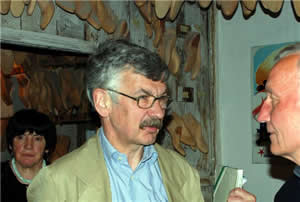
Christoph Hein (Heinzendorf, 8 april 1944)
De Afrikaanse-Amerikaanse schrijfster Nnedi Okorafor werd geboren op 8 april 1974 in Cincinnati, Ohio. Zie ook alle tags voor Nnedi Okorafor op dit blog.
Uit: Amphibious Green
„The grass in the yard reached just beyond her head. It was cool and damp from the morning’s dew. With a belly full of flies and after a night of thick sleep, she lazily decided to explore the yard. She sat for a moment, listening to the usual loud sounds of the yard — juicy flies zooming around, worms burrowing underground and the earthshaking footsteps of the ground hairless creatures. She was about to hop further along into the yard when the ground began to tremor. Shit! How could I be so absent -minded, she thought. At the last second she tried to make a hop for it. However, powerful as she was, her speed suffered because of her lack of one leg, her left one. The creature violently scooped her into its hands and for a moment she blacked out from pure shock. She shut her brown speckled eyes and prayed that the Unnamed had better things in store for her. The hairless being was making guttural sounds and jumping up and down. She felt her full stomach turn. She was whirled arou nd, poked and prodded, thrust into the faces of other hairless beings and then finally thrown into a flimsy box and left alone next to their home.
For hours, she could only sit there in shock, sick to her stomach. Her warts and bumps ached; her one foot and two hands were sore. Night finally fell, and she was still left alone. It had begun to rain by the time she had saved up enough energy for her escape. She threw her heavy bulk hard against the box’s wall again and again. By this time it had begun to rain and the box was deteriorating. She burst through it and hopped, free, into the night.“
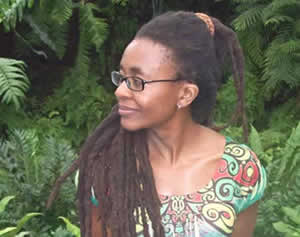
Nnedi Okorafor (Cincinnati, 8 april 1974)
De Amerikaanse schrijfster Barbara Kingsolver werd geboren op 8 april 1955 in Annapolis, Maryland. Zie ook alle tags voor Barbara Kingsolver op dit blog.
Uit: Small Wonder
„My daughters hazard the damp grass to go hunt box turtles and crayfish, or climb into the barn loft to inhale the scent of decades-old tobacco. That particular dusty sweetness, among all other odors that exist, invokes the most reliable nostalgia for my own childhood; I’m slightly envious and have half a mind to run after the girls with my own stick for poking into crawdad holes. But mostly I am glad to watch them claim my own best secrets for themselves.
On a given day I may walk the half mile down our hollow to the mailbox, hail our neighbors, and exchange a farmer’s evaluation of the weather (terrible; it truly is always either too wet or too dry in these marginal tobacco bottoms). I’ll hear news of a house mysteriously put up for sale, a dog on the loose, or a memorable yard sale. My neighbors use the diphthong-rich vowels of the hill accent that was my own first language. My great-grandfather grew up in the next valley over from this one, but I didn’t even know that I had returned to my ancestral home when I first came to visit. After I met, fell in love with, and married the man who was working this land, and agreed to share his home as he also shares mine in a distant place, I learned that I have close relatives buried all through these hollows. Unaccustomed as I am to encountering others with my unusual surname, I was startled to hear neighbors in this valley say, “Why, used to be you couldn’t hardly walk around here without stepping on a Kingsolver.” Something I can never explain, or even fully understand, pulled me back here.“
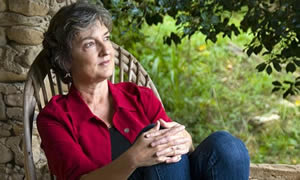
Barbara Kingsolver (Annapolis, 8 april 1955)
De Amerikaanse schrijver John Fante werd geboren in Colorado op 8 april 1909. Zie ook alle tags voor John Fante op dit blog.
Uit: A Kidnapping in the Family
„I would stare at that strange picture, kissing it and crying over it, happy because once it had been true. And I remember an afternoon when I took it down to the creek bank, set it upon a stone, and prayed to it. And in the kitchen was my mother, imprisoned behind pots and pans: a woman no longer the lovely woman in the picture.
And so it was with me, a kid home from school.
Other times I did other things. I would stand at the dresser mirror with the picture at my ear, facing the round mirror. A sheepishness, a shivering delight would possess me. How unbelievable this grand lady, this queen! And I remember that I would be speechless.
My mother in the kitchen at that moment was not my mother. I wouldn’t have it. Here was my mother, the lady in the big hat. Why couldn’t I remember anything about her? Why did I have to be so young when I was born? Why couldn’t I have been born at the age of fourteen? I couldn’t remember a thing. When had my mother changed? What caused the change? How did she grow old? I made up my mind that if I ever saw my mother as beautiful as she was in the picture I would immediately ask her to marry me. She had never refused me anything, and I felt she would not refuse me as a husband. I elaborated on this determination, even discovering a way to dispose of my father: my mother could divorce him. If the Church would not grant a divorce, we could wait and be married as soon as my father died. I searched my catechism and prayer book for a law which stated that mothers could not marry their sons. I was satisfied to find nothing on the subject.
One evening I slipped the picture under my waist and took it to my father. He sat reading the paper on the front porch.“
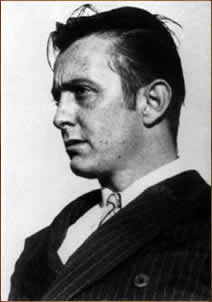
John Fante (8 april 1909 – 8 mei 1983)
De Duitse dichter Johann Christian Günther werd geboren op 8 april 1695 in Striegau. Zie ook mijn blog van 8 april 2007. Zie ook alle tags voor Johann Christian Günther op dit blog.
Bußgedanken
Ich höre, großer Gott, den Donner deiner Stimme;
Du hörest auch nicht mehr, ich soll von deinem Grimme
Aus Größe meiner Schuld ein ewig Opfer sein,
Ich soll, ich muß, ich will und gebe mich darein.
Ich trotze deinem Zorn, ich fleh nicht mehr um Gnade,
Ich will nicht, daß dein Herz mich dieser Straf’ entlade.
Du bist kein Vater mehr, als Richter bitt ich dich :
Vergiß vorher dein Kind, hernach verstoße mich.
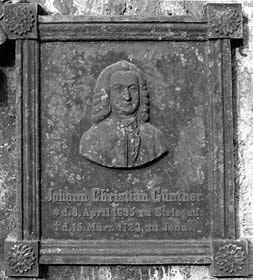
Johann Christian Günther (8 april 1695 – 15 maart 1723)
Zie voor nog meer schrijvers van de 8e april ook mijn blog van 8 april 2011 deel 2.
